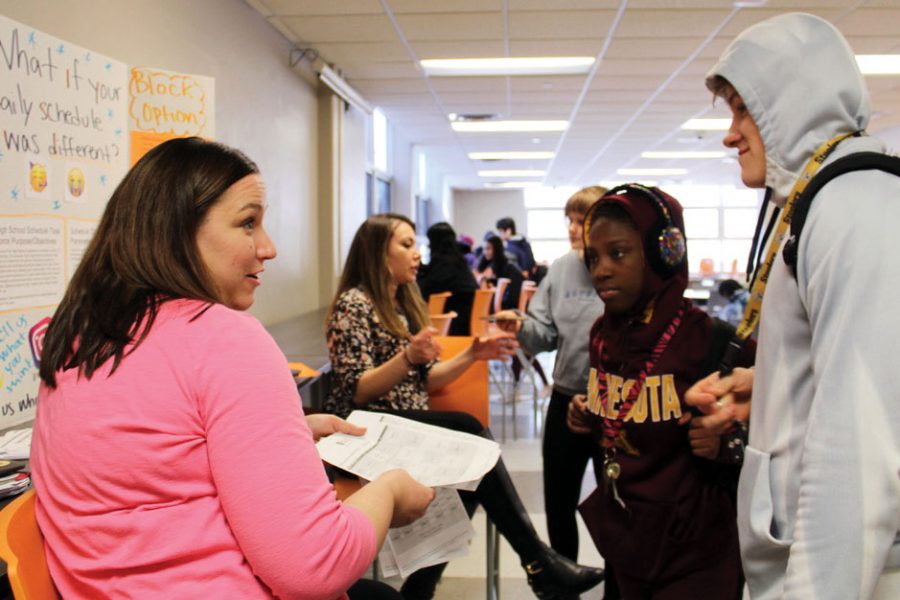Staff Editorial: Permanent block scheduling feels unnecessary
Assistant principal Jessica Busse explains the block schedule and seven-period schedule options to junior McCabe Dvorak and freshman Te’Seanna Tate Feb. 24. Students who participate in the survey will be entered to win gift cards.
March 4, 2020
As new start and end times come into effect in the 2020-21 year, the Scheduling Task Force has turned its focus on the 2021-22 year. Currently, it is presenting its options for the daily schedule. The seven-period option allows for meeting time before school and collaboration after third hour. The block schedule option has eight classes Monday and four alternating Tuesday through Friday, with rotating time for clubs, subject help and collaboration. Students and community members were able to give their feedback using a survey on Instagram through Feb 28.
The Echo Editorial Board applauds the Scheduling Task Force for asking for community input. Students are being affected by this change, and we appreciate that they have a voice in the matter.
However, we found the block schedule option ill-informed. Having seven classes a day already gives students enough stress, and many students find themselves in at least one study hall, earning no credits. Adding another class to the day, while allowing for more flexibility for some, may end up with more study halls across the board. Seven classes is enough to manage without the addition of another. Additionally, in a lot of subjects it is important to have daily reinforcement, particularly in our music and art programs.
While a block schedule would allow for longer classes and, as a result, better science lab experiences, it also presents many challenges. Focusing for 48 or 52 minutes can be difficult enough for many students, we wonder how 80 minute class periods will be managed. There are also a lot of issues that will need to be addressed, such as bathroom access and academic dishonesty.
On top of that, teachers will be forced to restructure their classes to accommodate for the longer classes. The administration said they plan on teaching how to make longer classes work for students, but there will inevitably be adjustment time. While we hope they will be taught to minimize homework and use the longer times to help students one-on-one, we fear teachers might overestimate the amount of homework they can give, or they might end up just talking at students for 80 minutes.
The collaboration and help time implemented in both options has the opportunity to be beneficial to students and staff, but we fear it may be abused and become free time that is wasted. We want to think it will be used wisely, but just can’t see it working productively each and every day.
Finally, we don’t see why a change is needed. The current schedule does not seem to be causing too many issues among students and it doesn’t make sense to change a system that works for students now. The administration should be focusing on much greater issues that need to be addressed, such as the widespread vandalism, lack of locks on bathroom stalls, and general school cleanliness. Additionally, we hear many complaints about block scheduling from middle school students who have block scheduling right now.
Based on these considerations, the Echo Editorial Board proposes a seven-period schedule with only two days of block scheduling per week for the 2021-2022 school year. This would provide students and staff with the benefits of limited block scheduling days, without the stress of an additional class.
We ask every student to make an informed choice that takes into account all factors and influences of their decision.



